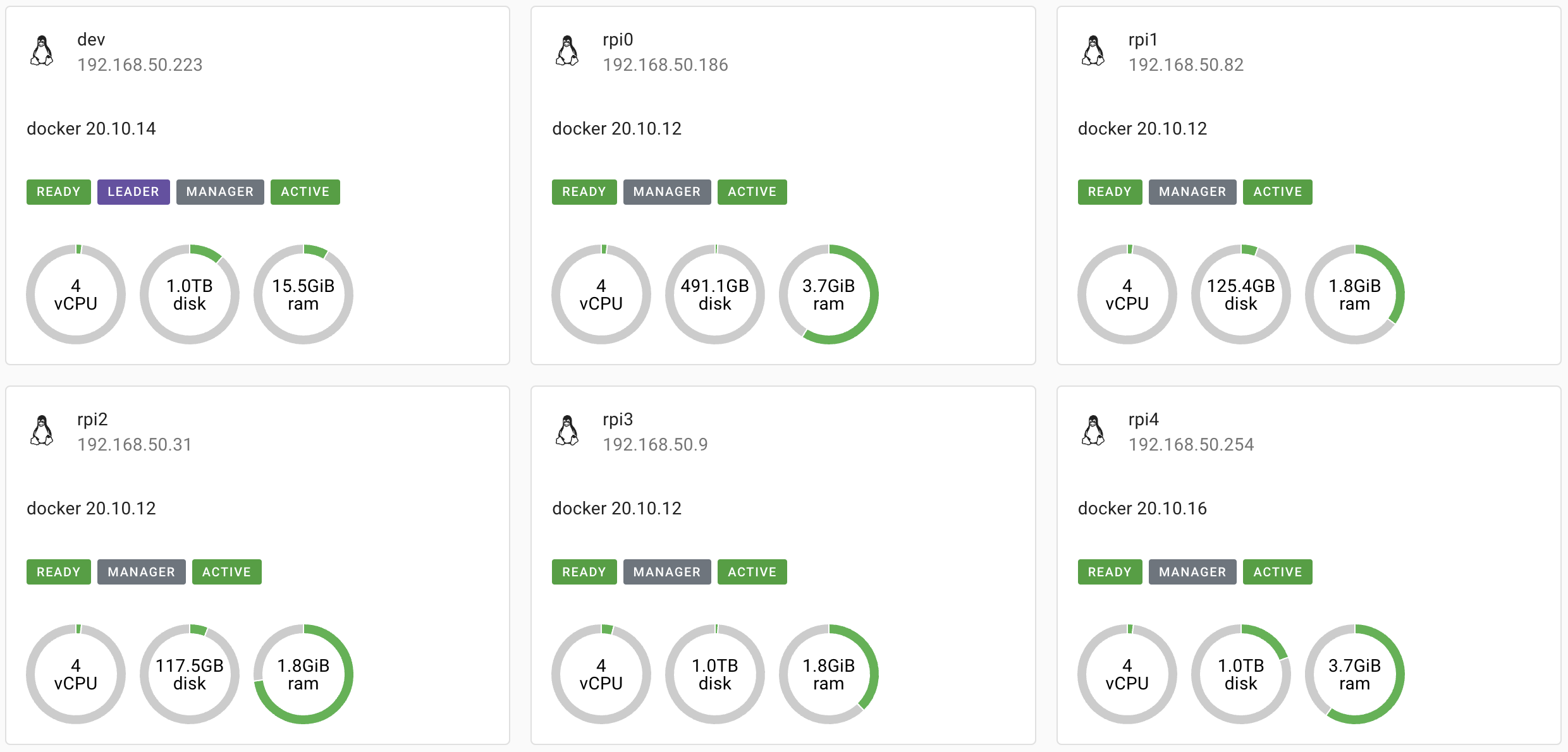This repository contains configuration (docker-compose.yml files) to set up the services I run on my home server. As well as, some useful scripts in the ./scripts directory.
Download Raspberry Pi OS Lite 64-bit.
Use the Raspberry Pi Imager and configure ssh and a user.
After flashing the image, create a file named ssh in /boot or /system-boot
Edit cmdline.txt and append ipv6.disable=1
Configure locale settings: sudo raspi-config
Run upgrades: sudo apt update && sudo apt full-upgrade -y
Create a new user
sudo adduser gordonpn
sudo passwd root
su root
adduser gordonpn sudo
exitAdd new user to groups that the pi belonged to
groups | sed 's/pi //g' | sed 's/ /,/g' | xargs -I{} sudo usermod -a -G {} gordonpn
Log out and log in with newly created user
Delete pi user
sudo deluser --remove-home pi
Lock the root user
sudo passwd -l root
On your client computer, copy your public key to the Pi
ssh-copy-id -i ~/.ssh/id_rsa.pub gordonpn@192.168.50.186
Disable SSH password auth on Pi and edit the following lines:
sudo vi /etc/ssh/sshd_config
PermitRootLogin no
PasswordAuthentication no
PubkeyAuthentication yes
ChallengeResponseAuthentication no
UsePAM no
Set a static IP to the Pi:
sudo vi /etc/dhcpcd.conf
interface eth0
static ip_address=192.168.50.186/24
static routers=192.168.50.1
static domain_name_servers=8.8.8.8 8.8.4.4
Change the hostname in both these config files:
sudo vi /etc/hosts
sudo vi /etc/hostname
Install UFW
sudo apt-get update && sudo apt-get install -y ufw
Edit /etc/default/ufw to disable ipv6:
sudo vi /etc/default/ufw
sudo ufw enable
Allow SSH from local network only
sudo ufw allow from 192.168.50.0/24 proto tcp to any port 22
https://www.digitalocean.com/community/tutorials/ufw-essentials-common-firewall-rules-and-commands
Block wifi and bluetooth
sudo rfkill block wifi && sudo rfkill block bluetooth
Disable bluetooth
echo "dtoverlay=disable-bt" | sudo tee -a /boot/config.txt
Disable avahi and TriggerHappy
sudo systemctl disable bluetooth
sudo systemctl stop bluetooth
sudo systemctl disable avahi-daemon
sudo systemctl stop avahi-daemon
sudo systemctl disable triggerhappy
sudo systemctl stop triggerhappysudo apt remove --purge -y bluez wolfram-engine triggerhappy xserver-common lightdm logrotate fake-hwclock samba-common && sudo apt autoremove -y --purge
sudo apt-get update && sudo apt-get install -y unattended-upgrades && sudo dpkg-reconfigure --priority=low unattended-upgrades
lsblk -f
sudo fdisk /dev/sda
sudo mkfs.ext4 /dev/sda1
sudo mkdir -p /media/drive
sudo mount -t auto /dev/sda1 /media/drive
sudo blkid /dev/sda1
sudo vi /etc/fstabAdd to bottom
echo "UUID=$(sudo lsblk -f | grep sda1 | awk '{print $4}') /media/drive ext4 defaults,auto,users,rw,nofail,noatime 0 0" | sudo tee -a /etc/fstab
Add at the bottom of /etc/rc.local
sleep 20
sudo mount -acurl -fsSL https://get.docker.com -o get-docker.sh && sudo sh get-docker.sh
sudo usermod -aG docker $USER && newgrp docker
Move Docker storage location elsewhere
sudo rsync -aP /var/lib/docker/ /media/drive/docker
sudo systemctl enable docker.service && sudo systemctl enable containerd.service
Enable experimental features and log rotation:
cat << EOF | sudo tee -a /etc/docker/daemon.json
{
"log-driver": "json-file",
"log-opts": {
"max-size": "10m",
"max-file": "3"
},
"experimental": true,
"features": {
"buildkit": true
},
"data-root": "/media/drive/docker"
}
EOFVerify that the new directory is being used to store images after running docker run hello-world
docker inspect $(docker images | grep hello-world | awk '{print $3}') | grep WorkDir
Remove old Docker data storage directory
sudo rm -rf /var/lib/docker
Enable ports for Docker Swarm
sudo ufw allow from 192.168.50.0/24 proto tcp to any port 2377
sudo ufw allow from 192.168.50.0/24 proto udp to any port 4789
sudo ufw allow from 192.168.50.0/24 to any port 7946docker swarm init --advertise-addr <MANAGER-IP>
Or join
docker swarm join --token #token
Add label to the node
docker node update --label-add name=rpi0 rpi0
sudo curl -L "https://github.com/docker/compose/releases/download/v2.5.0/docker-compose-linux-aarch64" -o /usr/local/bin/docker-compose
sudo chmod +x /usr/local/bin/docker-composeReduce swapiness
Add vm.swappiness=0 by using sudo vi /etc/sysctl.conf
Disable swap and remove
sudo systemctl disable dphys-swapfile && \
sudo dphys-swapfile swapoff && \
sudo dphys-swapfile uninstall && \
sudo update-rc.d dphys-swapfile removeMake flush writes only every 15 mins
Add ,commit=900 after defaults in /etc/fstab
Migrate some temp files to tmpfs
echo "tmpfs /tmp tmpfs defaults,noatime,nosuid,nodev 0 0" | sudo tee -a /etc/fstab
echo "tmpfs /var/spool/rsyslog tmpfs defaults,noatime,nosuid,nodev,noexec,size=50M 0 0" | sudo tee -a /etc/fstab
echo "tmpfs /var/log tmpfs defaults,noatime,nosuid,mode=0755,size=100m 0 0" | sudo tee -a /etc/fstabDisable system log using mask
sudo systemctl mask rsyslog.service && \
sudo systemctl mask systemd-journald.serviceHere are some examples
@reboot /home/gordonpn/workspace/server-services-configs/scripts/get_dhcp.sh
0 3 * * * /home/gordonpn/workspace/server-services-configs/scripts/backup.sh >> /home/gordonpn/logs/backup.log 2>&1
0 5 * * * /home/gordonpn/workspace/server-services-configs/scripts/update_containers.sh >> /home/gordonpn/logs/container_update.log 2>&1
@reboot sleep 600 && /usr/bin/docker swarm ca --rotate --quiet
0 */2 * * * /home/gordonpn/workspace/server-services-configs/scripts/force_rebalance.sh >> /home/gordonpn/logs/force_rebalance.log 2>&1
0 2 * * * cd /home/gordonpn/workspace/dotfiles && /usr/bin/git pull origin master
If you are using a reverse proxy somewhere then you need to allow port 80 and 443
sudo ufw allow http
sudo ufw allow httpsIf you want to allow your personal computer to connect to any of the ports
sudo ufw allow from 192.168.50.214On the host, install NFS:
sudo apt-get update && sudo apt-get install -y nfs-common nfs-kernel-serverCreate a directory to share and an NFS root directory
mkdir -p /media/drive/share
mkdir -p /srv/nfs4/shareBind mount the directories
sudo mount --bind /media/drive/share /srv/nfs4/shareMake the mount permanent
echo "/media/drive/share /srv/nfs4/share none defaults,bind 0 0" | sudo tee -a /etc/fstabAdd the directory to be exported
echo "/srv/nfs4 192.168.33.0/24(rw,sync,insecure,no_subtree_check,crossmnt,fsid=0) " | sudo tee -a /etc/exports
echo "/srv/nfs4/share 192.168.33.0/24(rw,sync,insecure,no_subtree_check) " | sudo tee -a /etc/exportsSave and export the shares
sudo exportfs -arVerify
sudo exportfs -vOn host and all clients, open port for NFS:
sudo ufw allow from 192.168.50.0/24 to any port nfsInstall on all clients
sudo apt-get update && sudo apt-get install -y nfs-commonCreate new directory for mount points
mkdir -p /mnt/shareMount the remote NFS
sudo mount -t nfs -o vers=4 192.168.50.9:/share /mnt/shareMake mount permanent
echo "192.168.50.9:/share /mnt/share nfs defaults,timeo=900,retrans=5,_netdev 0 0" | sudo tee -a /etc/fstab
